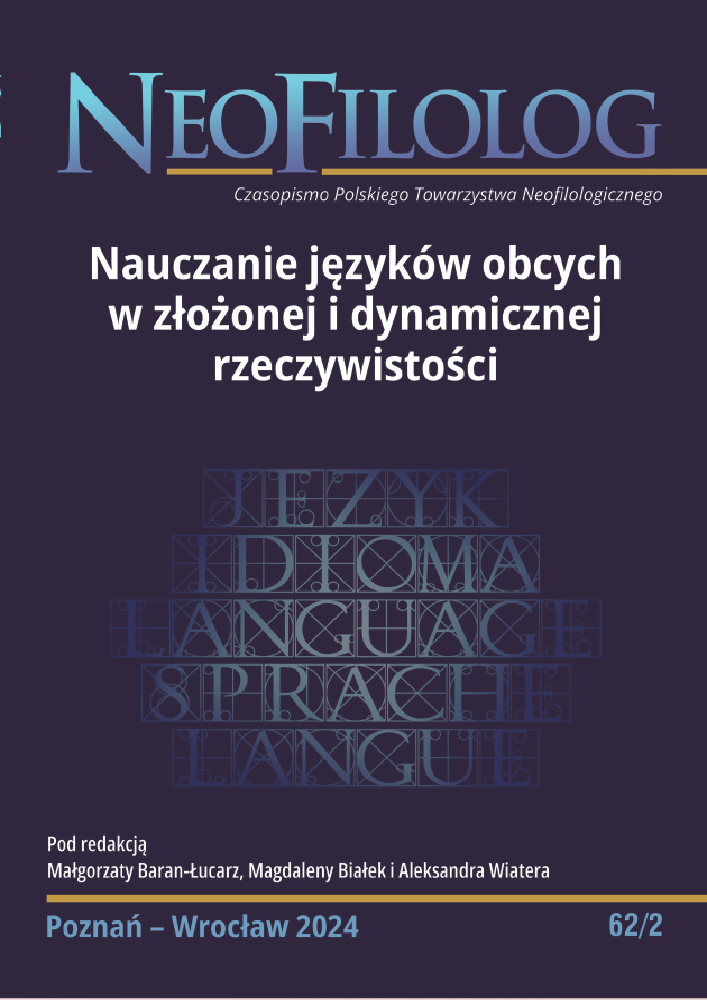Abstract
In February 2022, the invasion of Ukrainian territories by Russian forces took place, leading to a mass exodus of the Ukrainian population from the war-affected areas. Many individuals who left Ukraine due to the war sought refuge in Poland, and their children began attending Polish schools. Some of these children appeared in Polish classes only temporarily, but as reported by the Ministry of Education and Science in September 2023, 180,000 students from Ukraine began their education in Polish schools. The influx of Ukrainian children into Polish schools posed various challenges, especially for foreign language teachers, as their classes became linguistically and culturally heterogeneous. The aim of the conducted study was to answer the following questions: (1) What kind of challenges do German language teachers face in classes where students from Ukraine are learning? (2) Which teaching techniques do German language teachers consider most effective in linguistically and culturally heterogeneous classes? The article presents the results of the study conducted through interviews using an unstructured dialogical method with four German language teachers teaching elementary school students with migration experience. The research framework was based on the concept of Universal Design for Learning, taking into account the principles of inclusive teaching.
References
Brophy J. (2007), Motywowanie uczniów do nauki. Warszawa: Wydawnictwo Naukowe PWN.
Deci E., Ryan, R. (1985), Intrinsic motivation and self-determination in human behavior. New York: Plenum. DOI: https://doi.org/10.1007/978-1-4899-2271-7
Gass S. (2003), Input and interaction, (w): Doughty, C. J., Long, M. H. (red.) The Handbook of Second Language Acquisition. Oxford: Blackwell, s. 225–255. DOI: https://doi.org/10.1002/9780470756492.ch9
Gulińska A. (2021), Wsparcie ucznia z doświadczeniem migracyjnym w polskiej szkole. Rozprawy Społeczne/ Social Dissertations 2021;15(2):40–54. Online: https://rozprawyspoleczne.edu.pl/Autor-Aleksandra-Guli%C5%84ska/176480 [DW 21.11.2023]. DOI: https://doi.org/10.29316/rs/136360
Hattie J. (2015), Widoczne uczenie się dla nauczycieli. Jak maksymalizować siłę oddziaływania na uczenie się. Warszawa: Centrum Edukacji Obywatelskiej.
Krause K., Kuhl. J. (2018), Was ist guter inklusiver Fachunterricht? Qualitätsverständnis, Prinzipien und Rahmenkonzeption, (w): Roters B., Gerlach D, Eßer S. (red.) Inklusiver Englischunterricht. Impulse zur Unterrichtsentwicklung aus fachdidaktischer und sonderpädagogischer Perspektive. Münster, New York: Waxmann, s. 175–195.
Łobocki M. (2006), Metody i techniki badań pedagogicznych. Kraków: Impuls.
Pamuła-Behrens M., Szymańska M. (2018), Metoda JES-PL. Nauczanie języka edukacji szkolnej uczniów z doświadczeniem migracji. „Języki Obce w Szkole”, nr 2, s. 5–10. DOI: https://doi.org/10.31261/PS_P.2018.22.11
Pertek A., Scheler S. (2016), Inklusions-Material. Deutsch Klasse 5–10. Berlin: Cornelsen.
Reich K. (2014), Inklusive Didaktik. Bausteine für eine inklusive Schule. Weinheim und Basel: Beltz Verlag.
Rokita-Jaśkow J. (2022), Uczeń z doświadczeniem migracji na lekcji języka angielskiego: wyzwania i rozwiązania. „Neofilolog”, nr 58/2, s. 193–208. DOI: https://doi.org/10.14746/n.2022.58.2.4
Rokita-Jaśkow J. i in. (2022), Bridging the ‘dual lives’: school socialization of young bi/multilinguals in the eyes of EFL teachers. „International Journal of Bilingual Education and Bilingualism”, s. 1–16. DOI: https://doi.org/10.1080/13670050.2022.2114788
Riemer C. (2016), Befragung, (w:) Caspari D., Klippel F., Legutke M.K., Schramm K. (red.) Forschungsmethoden in der Fremdsprachendidaktik. Tübingen: Narr Francke Attempto, s. 155–173.
Ryan R. M., Deci E. L. (2000), Self-Determination Theory and the Facilitation of Intrinsic Motivation, Social Development, and Well-Being. „American Psychologist”, Vol. 55, No. 1, s. 68–78. DOI: https://doi.org/10.1037//0003-066X.55.1.68
Szumski G. (2011), Teoretyczne implikacje koncepcji edukacji włączającej, (w:) Z. Gajdzica (red.), Uczeń z niepełnosprawnością w szkole ogólnodostępnej. Sosnowiec: Oficyna Wydawnicza „Humanitas”, s. 13–23.
https://www.gov.pl/web/udsc/obywatele-ukrainy-w-polsce--aktualne-dane-migracyjne2 [DW 21.11.2023]
Nowelizacja rozporządzenia w sprawie organizacji kształcenia, wychowania i opieki dzieci i młodzieży z Ukrainy. Online: https://www.gov.pl/web/edukacja-i-nauka/nowelizacja-rozporzadzenia-w-sprawie-organizacji-ksztalcenia-wychowania-i-opieki-dzieci-i-mlodziezy-z-ukrainy [DW 21.11.2023]
https://www.prawo.pl/oswiata/ukrainskie-dzieci-w-polskich-szkolach,520015.html [DW 21.11.2023]
Razem w klasie. Dzieci z Ukrainy w polskich szkołach. Raport z badania. Online: https://www.szkolazklasa.org.pl/materialy/razem-w-klasie-dzieci-z-ukrainy-w-polskich-szkolach/ [DW 23.11.2023]
Rozporządzenie Ministra Edukacji i Nauki z dnia 11 sierpnia 2022 r. zmieniające rozporządzenie w sprawie organizacji kształcenia, wychowania i opieki dzieci i młodzieży będących obywatelami Ukrainy https://www.dziennikustaw.gov.pl/DU/rok/2022/pozycja/1711 [DW 21.11.2023]
Rozporządzenie Ministra Edukacji i Nauki z dnia 13 lipca 2023 r. zmieniające rozporządzenie w sprawie organizacji kształcenia, wychowania i opieki dzieci i młodzieży będących obywatelami Ukrainy https://isap.sejm.gov.pl/isap.nsf/DocDetails.xsp?id=WDU20230001367 [DW 23.11.2023].
License
Copyright (c) 2024 Monika Janicka

This work is licensed under a Creative Commons Attribution-NoDerivatives 4.0 International License.
Authors
Authors of texts accepted for publication in Neofilolog are required to complete, sign and return to the Editorial team’s office the Agreement for granting a royalty-free license to works with a commitment to grant a CC sub-license.
Under the agreement, the authors of the texts published in Neofilolog grant Adam Mickiewicz University in Poznań a non-exclusive, royalty-free license and authorize the use of Attribution-NoDerivatives 4.0 International (CC BY-ND 4.0) Creative Commons sub-license.
The authors retain the right to the free disposal of the work.
Users
Interested Internet users are entitled to use works that have been published in Neofilolog since 2017, under the following conditions:
▪ attribution – obligation to provide, together with the distributed work, information about the authorship, title, source (link to the original work, DOI) and the license itself.
▪ no derivatives – the work must be preserved in its original form. Without the author's consent, it is not possible to distribute the modified work in the form of translations, publications, etc.
Copyrights are reserved for all texts published since 2017.
Miscellaneous
Adam Mickiewicz University in Poznań retains the property right as a whole (layout, graphic form, title, cover design, logo etc.).

